Are you looking for home remedies for toothache? Dental pain is never fun to deal with, so it’s understandable you want to stop it fast. Fortunately, there are various toothache pain relievers you can try at home – both medicines and natural remedies.

Here you can find information on ways to stop a toothache at home, including:
- The best painkillers for toothache
- Severe toothache pain relief
- Topical treatments like toothache gels
- Natural remedies for toothache that you can make at home
Usually, the best cure for toothache is a trip to the dentist since underlying problems like tooth decay or infection can’t be treated at home. But we know it’s not always possible to get to the dentist straight away – and it may not actually be a problem with your teeth that’s causing the pain. Check out our article about dental pain causes and prevention for more about this.
If your oral pain is accompanied by swelling around your eyes or neck, or your mouth or throat is so swollen you’re having trouble breathing and swallowing, you should go straight to A&E. You can also call NHS 111 for advice on your medical problem.
The best painkillers for toothache in the UK
If you keep a supply of regular painkillers on hand, these are probably a good place to start when you need quick toothache pain relief at home.
Ibuprofen and paracetamol

Standard painkillers like paracetamol and ibuprofen can be enough to ease toothache, if not stop it altogether. Dental pain is often caused by swelling, in which case ibuprofen is the best painkiller for toothache because of its anti-inflammatory properties.
If taking one or the other isn’t effective, it’s safe for adults to take both, alternating them up to the maximum dose shown on each packet. For adults, this is 200-400mg of ibuprofen every 6-8 hours, up to a maximum of 1200mg every 24 hours, or 500-1000mg of paracetamol every 4-6 hours, up to a maximum of 4000mg (eight 500mg tablets) in 24 hours.
However, you should only do this as a temporary measure while you await dental care. People who self-medicate as a home remedy for toothache areat risk of liver failure from paracetamol overdose.
If your child has a toothache, you can give them the appropriate dose of children’s paracetamol or ibuprofen. You should also take them to the dentist as soon as possible. NHS dental care is free for children under 18 in the UK.
Aspirin
This is another over-the-counter painkiller that fights inflammation and can offer considerable toothache relief. Aspirin is only suitable for adults over 18 and you must not take it if you are bleeding from your mouth (or anywhere else), since it prevents blood from clotting.
You may have heard that you can put aspirin directly on sore gums to ease toothache, but you should never do this as it can damage soft tissue in your mouth.
Coedine (co-codamol)
If you need a stronger painkiller for toothache, you can get codeine from a pharmacy. Codeine is a weak opioid painkiller and is only available over the counter in a low dosage combined with paracetamol, known as co-codamol. Again, you should only use this for temporary toothache relief.
Naproxen
Taking naproxen for toothache can be effective because it works to reduce inflammation, which is often the cause of tooth pain. Naproxen is sold under the brand name Aleve, among others. You can get it on prescription from your dentist or buy it over-the-counter for toothache pain relief at home. It can be taken in conjunction with paracetamol, but not ibuprofen, and it’s not suitable for asthmatic patients. Naproxen can stop tooth pain for up to 12 hours.
Severe toothache pain relief

Over-the-counter painkillers may not be enough in certain cases, for example to stop severe tooth pain from a broken tooth – especially if the tooth nerve is exposed. Similarly, tooth abscess pain can be too intense for regular painkillers to have much effect.
You can combine these painkillers with any of the topical gels and natural remedies described below to help with severe dental pain relief.
If taking painkillers doesn’t help your toothache, or if you have to keep taking them for several days to keep relieving your pain, it’s a sign you should see a dentist. An emergency dentist can prescribe much stronger painkillers than you can get over the counter, as well as antibiotics if you have an infection or tooth abscess.
Topical toothache gels and ointments
Another type of home remedy for toothache is topical medicine designed specifically to treat toothache and other oral pain. Here are some of the best toothache gels and gum pain relief products available in the UK.
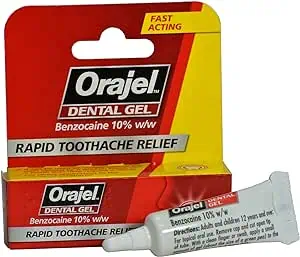
Orajel dental pain relief gel
Orajel dental gel is a severe toothache remedy designed to get rid of dental pain fast. The UK’s number one selling toothache brand also comes in an extra-strength formula that can be used to treat gum abscess or broken tooth pain.
Some reviewers say that Orajel’s tooth numbing gel has provided toothache relief where over-the-counter painkillers didn’t work. Others note that it’s effective as a home remedy for sensitive teeth, too.
Anbesol
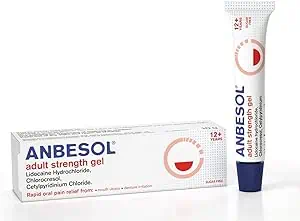
Anbesol is available as a liquid and a gel, both with anaesthetic and antiseptic ingredients. The tooth numbing formula is a good way to stop a toothache fast at home.
The adult strength toothache gel is more widely available online than the liquid. However, some people say they find the liquid more effective and easier to apply than the gel.
Dentogen Clove Oil Gel
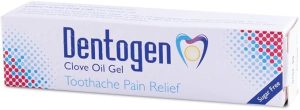
Dentogen offers the natural benefits of cloves (see below) in an easy-to-apply gel. This product provides quick relief from tooth and gum pain and is suitable for children (but not infants).
Reviewers say Dentogen is “highly effective” for getting rid of a toothache fast, although some find the taste a little unpleasant.
Natural remedies for toothache
There are various natural toothache pain relievers that can help soothe a toothache. Some of these have anti-inflammatory and antibacterial properties to help address the cause of the pain, too. We don’t recommend using any of these natural remedies for toothache in children unless you check with your dentist first.
Clove oil for toothache
Probably the best known natural remedy for toothache is clove oil. This contains eugenol, an ingredient with natural anaesthetic and antibacterial properties that also helps reduce inflammation.
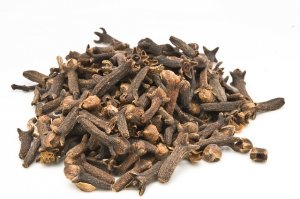
You find clove oil in pharmacies and health food shops or buy it here on Amazon.
To use clove oil for toothache pain relief, it’s best to dilute it first. Mix a few drops of clove oil with a teaspoon of olive, almond or coconut oil. Alternatively, you can buy a pre-made clove oil blend like this one.
Dip a cotton wool ball into the oil and hold it against the painful tooth for a few minutes. Avoid eating or drinking anything straight afterwards, and repeat every few hours if needed.
Clove oil can be an effective way to relieve toothache at home, but you should exercise caution when using any essential oils as a natural remedy, especially for children. Do your research so you know how much to use and at what dilution.
There are certain cases when clove oil should not be used to stop a toothache:
- Infants or toddlers experiencing teething pain
- Pregnant or nursing mothers
- Anyone with a bleeding disorder, since clove oil can slow down blood clotting
-Renad S. Nahhas, Pharmacist
If you don’t have clove oil to hand, you can also use whole cloves to treat toothache. Grind them (or use clove powder) and mix with oil to form a paste, then apply this to your mouth. It’s not as effective as using clove oil, but it should still help with toothache relief.
Salt water rinse
This easy toothache home remedy helps kill bacteria and reduce swelling in your mouth.
To use salt water for a toothache, add a teaspoon of salt to a small glass of warm water and stir until dissolved. Rinse this around in your mouth for up to a minute, then spit out.
Tea
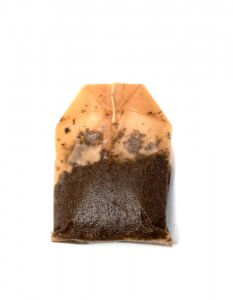
Another toothache remedy you can make at home is peppermint tea, which can help reduce swelling and pain. Brew with tea leaves or a teabag and leave it to steep for 10-15 minutes before sipping and swishing it around your mouth.
You can even use a regular black tea bag as a compress to ease toothache. Soak it in warm water then place it against the sore tooth for a few minutes. The astringent tannins in the tea might make your toothache go away for a while.
Garlic
Some people find garlic an effective home remedy for toothache, however, it has been known to cause skin burns – so try it at your own risk! You can mash a garlic clove into a paste and apply it to the painful tooth for 10-15 minutes.
Home remedies for toothache: Summary
The table below summarises the various toothache pain relievers you can use to treat tooth pain at home:
Remedy | Type | Benefits |
Ibuprofen | Painkiller | Pain relief, anti-inflammatory |
Paracetamol | Painkiller | Pain relief |
Aspirin | Painkiller | Pain relief, anti-inflammatory |
Coedine | Painkiller | Stronger pain relief |
Naproxen | Anti-inflammatory | Inflammation and pain relief |
Orajel | Gel | Topical pain relief |
Anbesol | Liquid or gel | Topical anaesthetic and antibacterial |
Dentogen | Gel | Topical pain relief |
Clove oil | Natural remedy | Anaesthetic and antibacterial |
Salt water rinse | Natural remedy | Antibacterial, anti-inflammatory |
Peppermint tea | Natural remedy | Pain relief, anti-inflammatory |
What else helps a toothache?
Aside from the home remedies for toothache mentioned above, there are some other things you can do to minimise pain from sore teeth and gums while you wait for it to pass or seek treatment.
What to eat when your teeth hurt
Any extra pressure on the affected tooth or teeth is likely to make your toothache pain worse. If you have pain from a cracked tooth, biting down on it could cause the crack to deepen – and the more damage there is, the less likely the tooth can be saved.
So, it will help stop the toothache worsening if you stick to soft foods and try to avoid chewing on the side that hurts. Soft foods to eat when you have a painful tooth include:
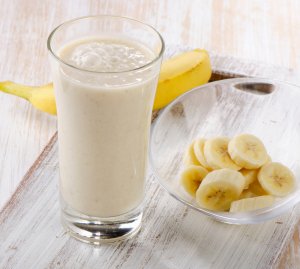
- Smooth soups
- Fruit smoothies and purees (but avoid acidic fruits)
- Milkshakes
- Mashed potato and other vegetables
- Scrambled eggs
- Yoghurt
- Porridge
- Bananas
Very cold or hot food and drinks will likely aggravate your toothache pain, as will anything particularly spicy, sugary or acidic, so try to avoid these.
Other ways to relieve toothache at home
- Don’t smoke: This can aggravate certain dental problems.
- Elevate your head while sleeping: To help get rid of toothache at night, use an extra pillow or two to keep your head elevated while you sleep. Lying flat increases the blood pressure in your head.
- Brush your teeth as normal: Unless there is damage to your tooth or gum, brush as normal to stop more harmful bacteria reaching your tooth.
- Ice pack: Although you shouldn’t place ice directly on the painful tooth, an ice pack or bag of frozen peas wrapped in a tea towel and placed on your cheek can help reduce swelling and numb pain.
- Use a temporary filling kit to fill any cavities or repair a broken tooth – but only use this as a short-term solution while you wait for a dental appointment.
How to stop a toothache for good
We hope these home remedies for toothache help you get your dental pain under control. If you’re recovering from recent dental work or your toothache is linked to a cold, it should improve by itself.

However, if you’re unsure why your teeth are hurting (or you know why and you just don’t want to deal with it), we strongly recommend you visit your dentist. Dental pain can be a sign of a number of oral health problems including:
- Tooth decay
- An infection or tooth abscess
- A cracked tooth
- A broken or loose filling
- Bruxism (teeth grinding)
- An impacted wisdom tooth
In all of these cases, ignoring the problem is likely to make it worse in the long run. Even if you manage to stop your toothache with one of these home treatments, that doesn’t mean the underlying cause is fixed. Tooth decay, for example, can destroy the tooth nerve to the point you no longer feel pain. But the decay will keep spreading through the tooth root and may cause an abscess (which is even more painful).
When tooth pain strikes, having an action plan in place can save you from lots of anxiety. The first thing you should do is call the dentist and schedule an appointment to be seen. If your tooth is showing signs of pain, it could signal that there is tooth decay inside the tooth.
However, cavities are not the only cause of toothaches, so the remedy for your dental pain might be quite simple. While you are waiting to be seen by your dentist, use a soft-bristled toothbrush to clean your teeth, as this will be gentler on the area that is sensitive. You should use a toothpaste specifically made for sensitivity as well.
It may seem obvious, but don’t chew on hard foods where you have a toothache. If tooth decay is causing your pain, this could cause the tooth to chip, crack, or break. In fact, if you have sharp pain while chewing or biting, it could be a sign that you already have a cracked tooth (or a cavity).
Dr. Angela Evanson, Angela Evanson DDS
It’s better to seek treatment straight away and avoid further damage which could require more drastic treatment like tooth extraction. You should also see a dentist if your dental pain lasts more than two days, or you have a high temperature or any swelling.
Conclusion
When you have a bad toothache and want to stop it fast, you should be able to get some relief from products you already have at home. Painkiller tablets, cloves and saltwater can all help ease toothache pain, and you can also buy special gels and ointments designed specifically for this purpose.
Ultimately, though, these home remedies for toothache should only be used temporarily. The best way to stop a toothache is usually to visit a dentist to treat the underlying cause. If you find yourself needing severe tooth pain relief, you should visit a dentist as soon as possible since you may have an infection that needs to be treated.
FAQs
What are the best home remedies for toothache?
Regular painkillers are usually effective at easing tooth pain, and there are special toothache gels and other medicines as well as some natural remedies that can work well. Clove oil is a proven tooth pain treatment, and it’s used in many over-the-counter remedies too.
Where can I get emergency toothache relief?
In a medical emergency, you can visit an A&E department for strong tooth pain relief and other emergency treatment. However, it’s unlikely the doctors there will be able to treat your dental problem. You’ll still need to book a dental appointment for this.
If you’re unsure whether your dental pain is an emergency, you can call NHS 111 for further advice and help finding an emergency dentist.
How do you get rid of toothache at night?
Toothache can be worse at night because lying down increases the blood pressure in your head. Raising your head with an extra pillow may help relieve this pain. There are also products like Aleve pm which contain a sleep aid to help you get a good night’s rest. These tablets are intended for occasional use only.
How can I sleep with toothache?
If you have trouble falling asleep with toothache, a topical dental gel like Orajel may help ease the pain enough for you to nod off. You can re-apply this throughout the night if needed, according to the instructions on the product. Also, try raising your head with an extra pillow.
Can you take ibuprofen and paracetamol together for toothache?
Yes, but this is provided you have no contraindications. Dentists say you may alternate paracetamol and ibuprofen for a toothache up to the maximum daily dosage of each one. It’s not recommended that you do this for more than a day or two. If you’re unsure what is the best thing to take for your toothache, consult your dentist or pharmacist.
What’s the best severe toothache remedy?
You can use over-the-counter painkillers and topical gels to relieve severe tooth pain at home. However, the best cure for bad toothache is to visit a dentist. If you are in extreme pain, you can ask for an emergency appointment. Don’t try to pull your tooth yourself, however bad it feels!
NHS. Toothache. Consulted 12 March 2019.
Clemson University. pH Values of Common Foods and Ingredients. Consulted 12 March 2019.
British Dental Journal. Orajel: The UK’s number one selling toothache brand. Consulted 12 March 2019.




